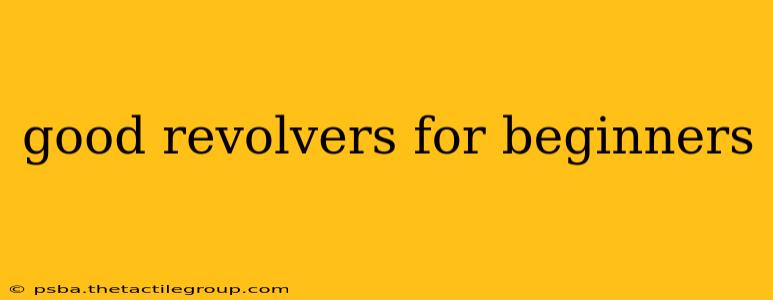Choosing your first revolver can be exciting, but it's crucial to select a model that prioritizes safety, ease of use, and reliability. This guide will explore several excellent options for beginner shooters, focusing on factors like caliber, action type, and overall handling. Remember, responsible gun ownership involves thorough training and adherence to all safety regulations. Always consult with experienced shooters and firearm instructors before handling any firearm.
Key Considerations for Beginner Revolver Selection
Before diving into specific models, let's consider the essential factors to keep in mind:
1. Caliber: Starting Small and Safe
For beginners, a less powerful caliber is recommended. Larger calibers generate significant recoil, which can be intimidating and even unsafe for inexperienced shooters. Popular choices for beginners include:
- .22 LR: This is arguably the best caliber for beginners. The low recoil allows for easier target acquisition and follow-up shots. Ammunition is inexpensive and widely available, making it ideal for practice.
- .38 Special: While slightly more powerful than .22 LR, the .38 Special still offers manageable recoil for many beginners. It's a versatile round suitable for both target practice and self-defense (with proper training).
Avoid starting with higher-caliber revolvers like .44 Magnum or .45 Colt unless you have extensive experience with firearms and are comfortable handling significant recoil.
2. Action Type: Single-Action vs. Double-Action
Revolvers come in two primary action types:
- Single-Action: Requires the shooter to manually cock the hammer before each shot. This offers a smoother trigger pull and generally greater accuracy, but it's slower for rapid firing.
- Double-Action: Allows the shooter to both cock the hammer and fire the gun with a single trigger pull. This is faster for multiple shots but can have a heavier and less predictable trigger pull, making it slightly more challenging for beginners. Many modern revolvers offer both single and double-action capabilities.
For beginners, a double-action revolver is often recommended due to its simplicity and ease of use. However, if you prioritize accuracy and are willing to invest the time in learning the single-action technique, a single-action revolver can be a rewarding choice.
3. Size and Weight: Finding the Right Fit
The size and weight of the revolver should be comfortable for you to handle. A revolver that's too heavy or bulky can be tiring to shoot, especially during extended practice sessions. Consider trying out different models at a gun range before making a purchase.
Top Revolver Recommendations for Beginners
Based on the above considerations, here are some excellent revolver options for beginner shooters:
Budget-Friendly Options:
- Ruger SP101 (in .22 LR or .38 Special): Known for its durability and reliability, the Ruger SP101 is a solid choice for beginners who want a compact and well-built revolver at a reasonable price.
Mid-Range Options:
- Smith & Wesson Model 642 (in .38 Special): This snub-nose revolver is popular for concealed carry but is also suitable for target practice. Its small size makes it easy to handle, and the .38 Special offers a decent balance of power and recoil management.
- Taurus 85 (in .38 Special): A more affordable option than Smith & Wesson, the Taurus 85 is a decent double-action revolver for beginners on a tighter budget. However, always prioritize thorough research before purchasing any Taurus firearm, as quality control can be inconsistent.
Higher-End Options (for those ready to invest more):
- Colt Python (in .357 Magnum or .38 Special): While often more expensive and not necessarily ideal for beginners due to higher caliber options, the Colt Python represents a legendary revolver known for its exceptional craftsmanship and accuracy. If budget allows and you're comfortable with the higher caliber, this can be a great long-term investment.
Safety First: Essential Reminders
- Always treat every firearm as if it were loaded. This is the most crucial safety rule in firearm handling.
- Never point a firearm at anything you don't intend to shoot. This applies even when the gun is unloaded.
- Keep your finger off the trigger until you are ready to shoot. Accidental discharges can be prevented by maintaining proper trigger discipline.
- Be sure of your target and what is beyond it. This prevents accidental injury or property damage.
- Always store firearms securely and unloaded, separate from ammunition. This helps prevent accidental access by children or unauthorized individuals.
This guide provides a starting point for your research. Remember to visit your local gun range, handle different models, and consult with experienced shooters and instructors to make an informed decision that aligns with your skill level, budget, and shooting goals. Safe and responsible gun ownership is paramount.

